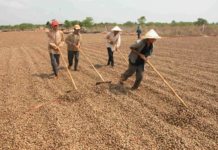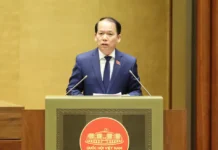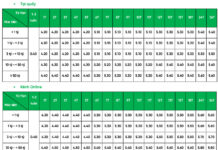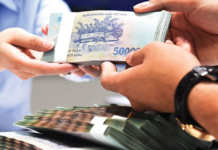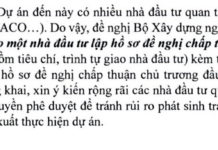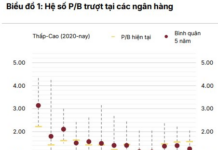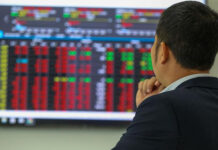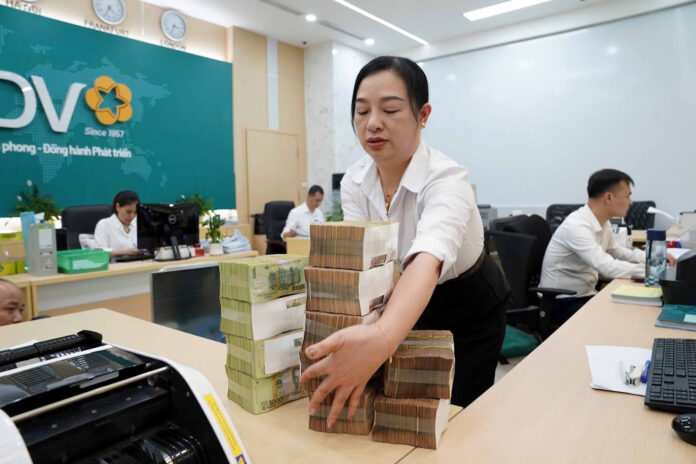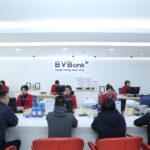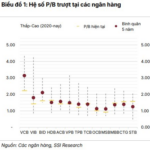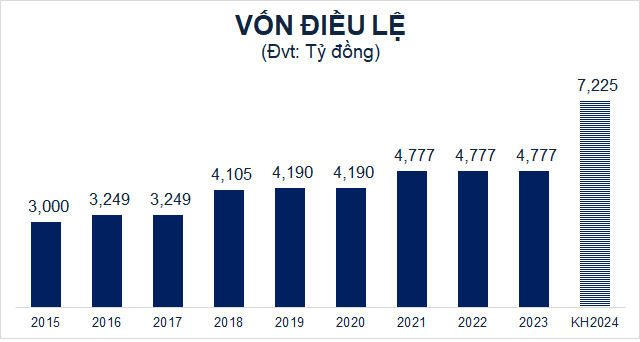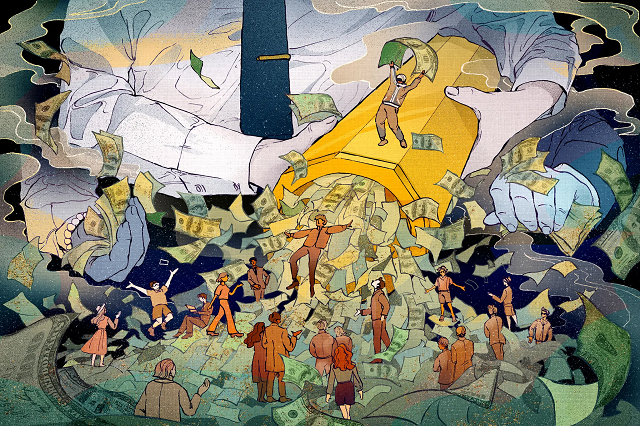Businesses Breathe a Sigh of Relief as Costs Ease
The VND/USD exchange rate has been on a downward trend in recent days. On August 21st, the State Bank of Vietnam (SBV) set the reference exchange rate at 24,246 VND/USD. Meanwhile, some major commercial banks adjusted their selling prices lower, though not uniformly. In the global market, the US Dollar Index (DXY) stood at 101.41 points.
At commercial banks, the exchange rate is also seeing mixed movements. At Vietcombank, the USD buying and selling rates on August 21st increased by 10 VND from the previous session, reaching 24,720 – 25,090 VND/USD.
At BIDV, the USD/VND exchange rate stood at 24,740 – 25,080 VND/USD. Meanwhile, Techcombank maintained its rates at 24,670 – 25,180 VND/USD.
The free market VND/USD exchange rate was quoted at 25,320 – 25,420 VND/USD, the lowest level since March. The free market rate has been falling sharply in the past month, especially in the first half of August. Compared to the peak of nearly 26,000 VND in late June, the free market rate is now lower by 600 VND, equivalent to a decrease of about 2.3%.
Many predictions suggest that exchange rate pressure will ease and fluctuate within the range of 25,300 – 25,700 VND/USD for the remainder of 2024, influenced by positive factors such as a favorable trade surplus (a surplus of over $14 billion in the first seven months), record-high FDI disbursement (over $12.5 billion), and a strong recovery in tourism.
With 10 million international visitors in the first seven months of 2024, Vietnam is witnessing a rapid recovery to the high-growth period of 2009 and is likely to achieve and surpass the target of 18-19 million international visitors this year. The stability of the macro environment is expected to be maintained and further improved, providing a foundation for exchange rate stability in 2024.
According to economic experts, the US dollar is expected to weaken from now until 2027, and the SBV will have more room to stabilize the VND. Therefore, investing in USD may not be a wise choice. While a weaker exchange rate may reduce export revenues for businesses, it boosts domestic production and helps curb inflation.
A representative of Hanoi Industrial Trading and Investment Joint Stock Company, a manufacturer of molds and components for automobiles and motorcycles, shared that the company currently supplies about 600 products to domestic and foreign automakers. Raw materials are imported and paid for in USD, amounting to approximately 8 billion VND per month, the most significant cost for their products.
Mr. Trinh Ba Ngoc, Director of Hanoi Industrial Trading and Investment Joint Stock Company, said, “Even a slight decrease in the exchange rate can save the company dozens to hundreds of millions of VND, enhancing our price competitiveness.”
Similarly, EMIN Vietnam Joint Stock Company, which imports 11 billion VND worth of goods per month, all paid for in foreign currency, has benefited from the recent depreciation of the VND against the USD. Their procurement costs have decreased by 2-4% compared to the peak.
“The current decrease in the USD exchange rate has led to lower input costs for our orders, benefiting both consumers and the company. We can sell our products at lower prices, which boosts sales and revenue,” said Mr. Tong Minh Phuong, International Purchasing Manager at EMIN Vietnam.
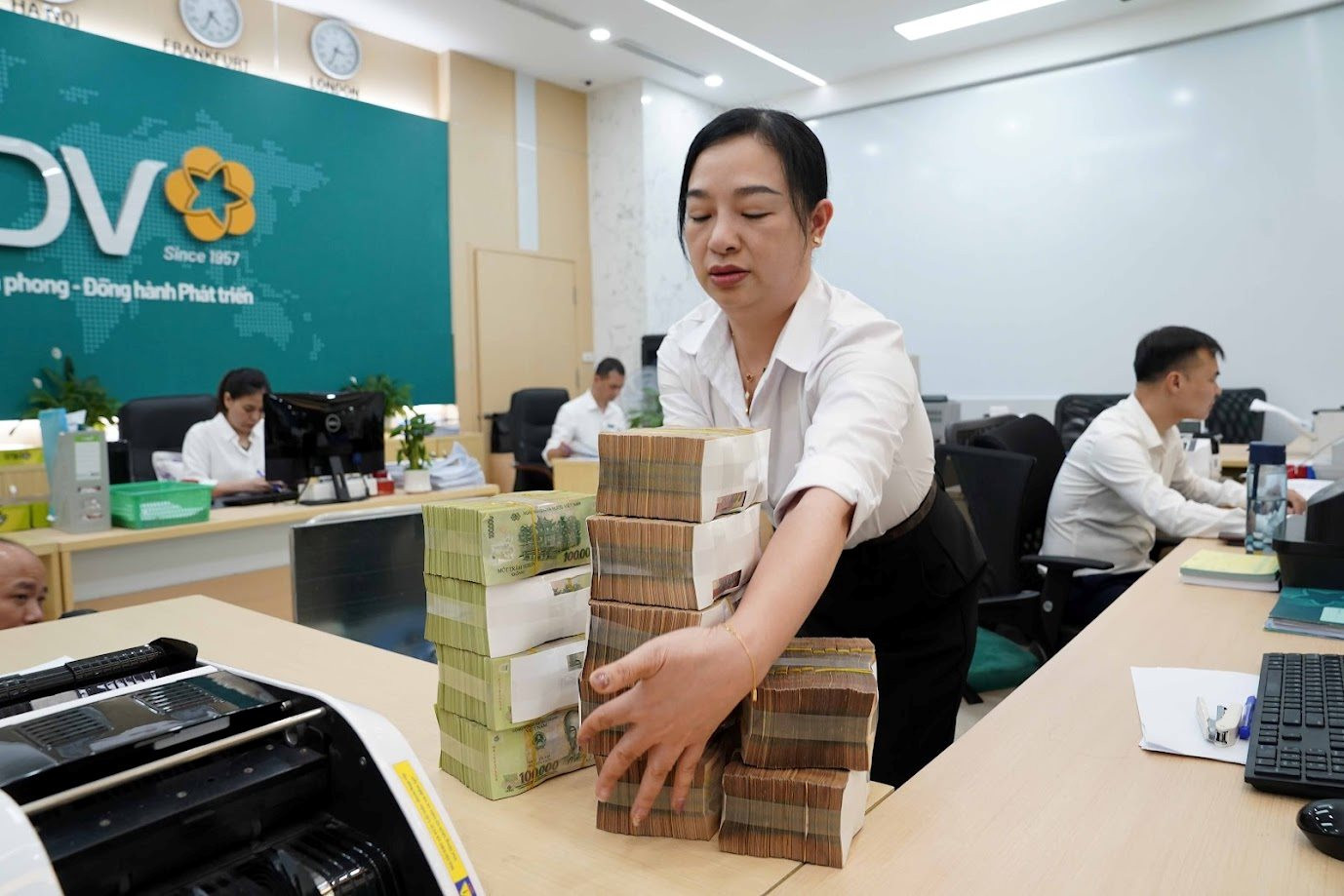
Financial market developments strongly impact capital flows into banks. Photo: Quang Vinh.
Interest Rates Continue to Climb
In reality, when the exchange rate stabilizes, monetary authorities have more flexibility to loosen monetary policy. Recently, commercial banks have boldly increased interest rates by about 0.2-0.7%, and they are expected to rise slightly further in the coming months. Currently, some banks offer rates above 6%/year for 12-month and longer-term deposits. For 6-12 month terms, rates range from 4-5%/year, and for less than 6 months, they are between 2-4%/year.
The increase in savings rates aims to attract more deposits from residents. Data from the SBV showed that resident and economic organization deposits reached an estimated 13,575 trillion VND as of June, up 1.5% from the end of 2023.
The second-quarter and six-month financial reports of banks also indicated continued growth in resident deposits. In terms of absolute value, the four state-owned banks remain the leaders in attracting savings deposits.
According to economic expert Le Xuan Nghia, the rise in interest rates can be attributed to three factors: inflation, exchange rates, and gold prices. However, the recent increase in deposit rates has been moderate, giving savers a sense of relief without implying a reversal in monetary policy.
Associate Professor Dr. Nguyen Huu Huan of the University of Economics Ho Chi Minh City also stated that the current pace of interest rate hikes is in line with market developments. This will make savings deposits more attractive, encouraging investors to return to this low-risk option, especially when other investment channels are risky and unsuitable for most residents.
Recently, Dr. Nguyen Tri Hieu shared his investment perspective with the media, suggesting that safety and liquidity should be the top criteria for allocating capital. Specifically, he recommended allocating up to 50% to bank deposits as interest rates are rising and offer high safety and liquidity.
Additionally, he suggested investing a portion in real estate and securities, as these channels show signs of recovery. As for gold investment, he warned of its high risk.
Strong Capital Inflows into Real Estate?
Mr. Nguyen Quang Tan from Long Bien, Hanoi, who recently purchased a 90-square-meter plot of land in Bat Khoi, Long Bien, for 4.4 billion VND, shared that investing in real estate is the safest option when you have surplus funds. You can sell when profits meet expectations or build a house if you can’t sell.
Many individuals express a strong desire to invest in real estate, expecting property prices to rise.
Mr. Nguyen Tho Tuyen, Chairman of BHS Group, analyzed that with the new Land Law, Housing Law, and Real Estate Business Law taking effect, the market is entering a new phase, and real estate prices are expected to increase. As a result, capital is flowing into products with complete legal procedures and reasonable prices.
“Currently, low-rise real estate with clean legal status and auctioned land in the provinces are attracting investors as safe assets. Most investors want to buy now to gain advantages in terms of price and potential for future price increases,” said Mr. Tuyen.
Mr. Vo Hong Thang, Investment Director of DKRA Group, believes that, in the medium and long term, these laws will enhance market transparency, protect investors, and foster sustainable development. However, he predicts that it is challenging to achieve significant growth in prices and supply in the short term. “It will take 6-12 months for these laws to truly permeate the market,” said Mr. Thang. He also noted that market sentiment is currently divided into two extremes. On the one hand, investors who used financial leverage in the previous cycle tend to hold on, expecting opportunities. On the other hand, investors with large cash reserves are adopting a wait-and-see approach. “In this uncertain context, affordable condominium apartments will continue their recovery and lead the market,” the representative of DKRA Group asserted.
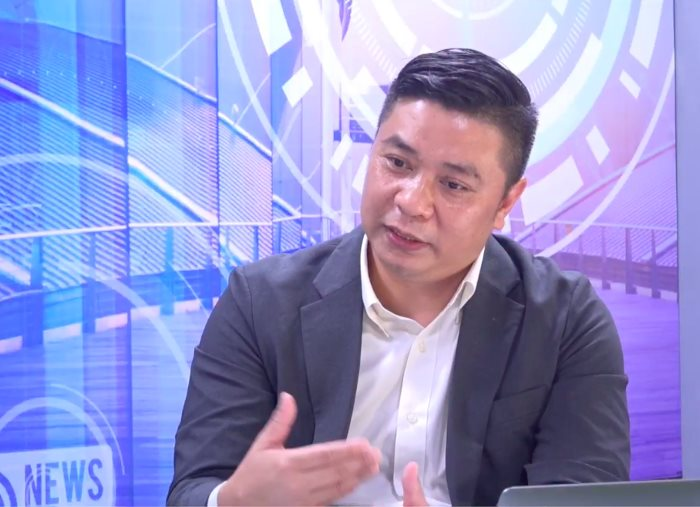
Mr. Nguyen Minh Tuan, CEO of AFA Capital, suggested increasing the proportion of bank deposits and being cautious with gold investments. Interest rates in the domestic market have been on an upward trend after the SBV’s measures to stabilize the exchange rate. I believe that from now until the end of the year, there will be more opportunities, and we need to prepare a certain amount of money to allocate to other asset classes. Regarding gold, in theory, the world gold price is still supported, especially with the expected weakening of the USD. However, the SBV has recently demonstrated its determination and efforts to stabilize the gold market.
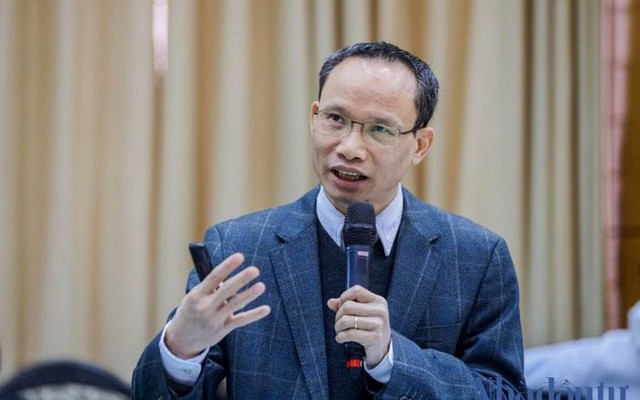
According to economic expert Can Van Luc, among investment channels, savings deposits remain attractive. The current 12-month deposit rate of 5-6%/year ensures that investors do not lose out significantly, and it offers high liquidity and safety. In practice, personal deposits continue to flow into the banking system. However, real estate and securities are also noteworthy investment channels.
Which bank offers the highest interest rate for online savings in early February 2024?
Beginning February 1st, 2024, several banks have been adjusting their interest rates downwards for savings accounts ranging from 1 to 24 months. Based on a survey conducted across 16 banks, the highest annual interest rate for online savings deposits at a 6-month term is 5%, while for a 12-month term, it is 5.35%.
Banks Sacrificing Profits to Support the Economy
In 2023, the question “which bank has the lowest interest rates?” is being talked about more than ever. With the prevailing difficult economic situation affecting individuals and businesses, in line with the directive of the State Bank of Vietnam (SBV), banks have unanimously sacrificed their profits by reducing lending rates and introducing credit packages with interest rates as low as 0%.



